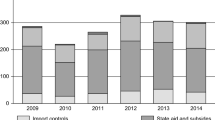Abstract
This paper argues that the anticipation of protection can have astimulating effect on exports instead of the commonly claimed effect of harassment. If protection serves market cartelization by fixing export quantities or prices, exporters may have an incentive to increase their sales abroad in order to secure a large share of the expected rent, which is brought about by the anticipated import restriction. This may even result in sales below marginal costs or dumping.The effect of the protectionist threat may then be the reverse of what is intended: it can raise the speed of import penetration and it can provoke dumping. A formal model and a supportive institutional analysis of EC trade protection is supplemented by preliminary empirical evidence.
Similar content being viewed by others
References
Anderson, J.E. (1992). Domino dumping I: Competitive exporters.American Economic Review 82: 65–83.
Bhagwati, J.N. (1988).Protectionism. Cambridge: MIT Press.
de Clerq, W. (1988). Fair practise, no protectionism.Financial Times (London) (Monday, 21 November): 21.
Ethier, W.J. (1982). Dumping.Journal of Political Economy 90: 487–506.
European CommunitiesOfficial Journal of the European Communities. Brussels. Various issues.
Eymann, A. and Schuknecht, L. (1993). Antidumping in the European Community. In J.M. Finger (Ed.), Anti-dumping: How it works and who gets hurt. Ann Arbour: University of Michigan Press. Forthcoming.
Finger, J.M. (Ed.), (1993). Anti-dumping: how it works and who gets hurt. Ann Arbour: University of Michigan Press.
Hillman, A.L. and Katz, E. (1986). Domestic uncertainty and foreign dumping.The Canadian Journal of Economics 19: 403–416.
Hillman, A.L. and Ursprung, H.W. (1988). Domestic politics, foreign interests, and international trade policy.The American Economic Review 78: 729–745.
Hillman, A.L. (1990). Protection as the regulation of international industry.Public Choice 67:101–110.
Hoekman, B.M. andLeidy, M.P. (1990).Policy responses to shifting comparative advantage: Designing a system of emergency protection.Kyklos 43: 25–51.
Kostecki, M. (1987). Export-restraint arrangements and trade liberalization.The World Economy 10: 425–453.
Leidy, M.P. and Hoekman, B.M. (1991). Spurious injury as indirect rent seeking: Free trade under the prospect of protection.Economics and politics 3: 111–137.
Messerlin, P.A. (1989). GATT-inconsistent outcomes of GATT-consistent laws: The long-term evolution of the EC antidumping law. The World Bank. Mimeo.
Messerlin, P.A. (1990). Antidumping regulations or procartel law? The EC chemical cases.The World Economy 13: 465–492.
Person, T. and Tabellini, G. (1990).Macroeconomic policy, credibility and politics. Chur: Harwood Academic Publishers.
Schuknecht, L. (1992).Trade protection in the European Community. Harwood Academic Publishers.
Stegemann, K. (1990). EC anti-dumping policy: Are undertakings a legal substitute for illegal price fixing?Weltwirtschaftliches Archiv 126:268–298.
Stegemann, K. (1991). The international regulation of dumping: Protection made too easy. Queen's University, Canada: Mimeo.
Tharakan, P.K.M. (1991).The political economy of anti-dumping undertakings in the European Community.European Economic Review 35: 1341–1359.
Tullock, G. (1980). Efficient rent-seeking. In J.M. Buchanan, R.D. Tollison and G. Tullock (Eds.),Toward a theory of the rent-seeking society, 97–112.
Viner, J. (1923/1966).Dumping: A problem in international trade. New York: Kelley.
Winters, A.L. (1990). Import surveillance as a strategic trade policy. CEPR Discussion Paper No. 404.
Author information
Authors and Affiliations
Additional information
We thank Lydia Ortega, Arye Hillman, Günther Schulze, Heinrich Ursprung, Roland Vaubel and an anonymous referee for their comments. An earlier version of this paper was presented at the Meeting of the European Public Choice Society, Torino, 1992.
Rights and permissions
About this article
Cite this article
Schuknecht, L., Stephan, J. EC trade protection law: Produmping or antidumping?. Public Choice 80, 143–156 (1994). https://doi.org/10.1007/BF01047952
Accepted:
Issue Date:
DOI: https://doi.org/10.1007/BF01047952




